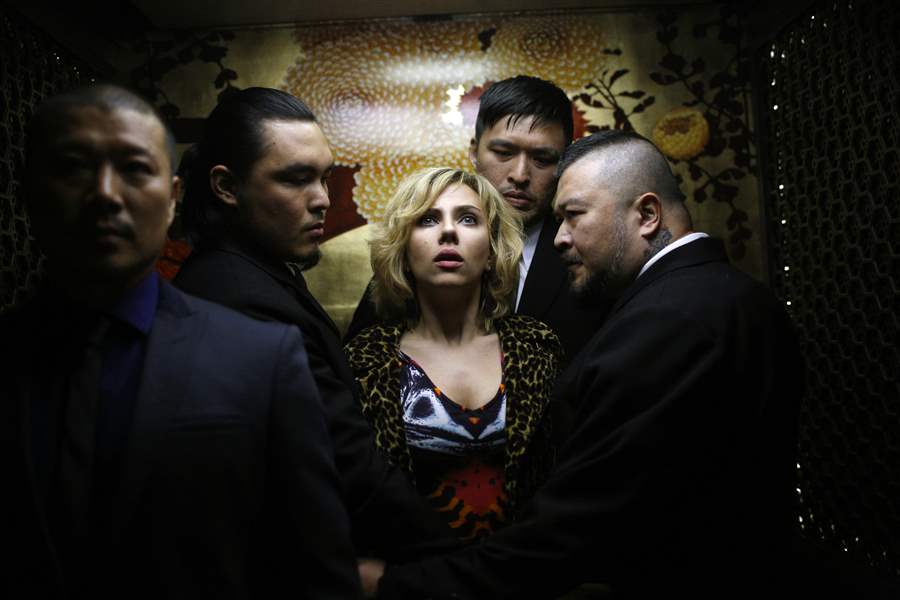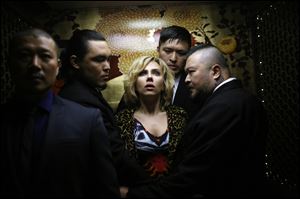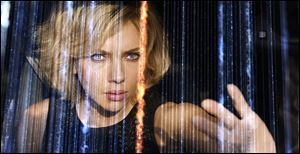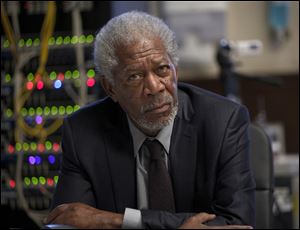
Action-thriller 'Lucy' falls flat
Movie about brain power not very entertaining
7/25/2014
Scarlett Johansson is kidnapped by an Asian mob boss in this scene from ‘Lucy.’
Universal Pictures

Scarlett Johansson is kidnapped by an Asian mob boss in this scene from ‘Lucy.’
Humans typically use only 10 percent of our brains.
So what happens if we could access all of it?
Writer-director Luc Besson attempts to answer that question in his new action-thriller Lucy, the story of a powerful new drug forcibly implanted in a woman that unleashes the god-like potential of her mind.
It’s an interesting premise with two fundamental flaws.
First, the “only 10 percent” use is a myth. As neuroscience testing repeatedly has shown, humans access 100 percent of their brain, just not at the same time.
Written and directed by Luc Beeson. A Universal Pictures release, playing at Franklin Park, Fallen Timbers, and Levis Commons.
Rated R for strong violence, disturbing images, and sexuality. Running time: 90 minutes.
Critic’s rating: ★½
Cast: Scarlett Johansson, Morgan Freeman, Min-sik Choi.
Since Lucy is a work of science-fiction — more like superhero fantasy — its lack of science fact can be easily overlooked.
What happens next, however, can’t, as Lucy (Scarlett Johansson) battles a ruthless Asian mob boss named Mr. Jang (Min-sik Choi), who wants his drugs back, including those unopened bags she took from the other drug mules, chasing her across Europe, defeating armed authorities at every turn, until the anticlimactic showdown.
And thus the second flaw of the film: its rapid deterioration into utter nonsense.

Johansson finds she can alter the very fabric of reality after she gains full use of her brain in ‘Lucy.’
For a film about someone so smart, Lucy is aggressively dumb.
Why, for instance, wouldn’t Lucy permanently incapacitate — if not outright eliminate — those trying to kill her when she confronts them in a hospital hallway? Instead, she leaves them temporarily suspended in mid-air while she speeds off in a police car. Wouldn’t her superior mind at least anticipate that the killers will come after her again? And why didn’t the cops at least arrest them?
Adding to the film’s unintentional silliness are the good guys: A Paris cop named Pierre (Amr Waked) helping Lucy, who never once thinks to ask her about her incredible abilities — like causing a dozen people to drop to the floor in deep sleep.
And a leading brain expert, Professor Norman (Morgan Freeman), whose life’s research into our mental evolution culminates in the appearance of Lucy. So when she meets him, he has no idea what to do but stand dumbfounded, along with other neurological experts, and watch as the events unfold.
Besson’s history is crafting strong female leads (1990’s La Femme Nikita, 1997’s The Fifth Element, 1999’s The Messenger: The Story of Joan of Arc), which explains why Waked is a non-entity in the film, and Freeman collects the easiest paycheck he’s ever made as a scientist whose intellectual curiosity consists of staring.
Johansson’s Lucy is different as well, at least initially. She’s weak and soft — forced into delivering a mysterious briefcase to the mob boss and throwing up at the sight of blood of those he recently murdered.

Morgan Freeman plays leading brain expert professor Norman in a scene from the movie.
Once the drugs kick in with a rapid transformation into a one-woman army, Lucy embodies all the hallmarks of a Besson feminist protagonists: beautiful, self-sufficient, and dangerous, an anti-hero who kills for self-protection.
Known for playing tough women like Black Widow from the Marvel films, Johansson is the perfect embodiment of those traits. She’s also versatile enough to pull off Lucy’s moral ambiguity, including walking into a hospital for help and shooting a patient because he is terminal with cancer and she didn’t have time to wait for the doctor to finish the procedure.
Lucy is not unlike another recent Johansson role in Under the Skin, that of an alien seductress who lures single men into her mysterious lair, where they sink into a tar-like sludge and are harvested for their skin. Skin’s alien who walks among us, however, was far more interesting and haunting; it grew increasingly human, while Lucy’s hyper intelligence only diminishes her ability to feel and empathize.
At each stage in her mental evolution, Lucy accesses new Matrix-like powers, including the ability to control matter and other people, telekinesis, and seeing the invisible streams of cellular communication around her.
And what happens when she reaches the point of using 100 percent of her brain? Professor Norman said he isn’t sure. Besson clearly isn’t, either, as he attempts a 2001: A Space Odyssey profound finale and instead concocts a comically bad twist that connects Lucy with humanity’s development — including a Creation of Adam by Michelangelo moment. So, yes, there’s a reason one of Besson’s characters here shares the same name with what scientists have dubbed the first human.
Just as corny are the director’s insertions of wildlife footage of a cheetah chasing its prey during the initial meeting between Lucy and Mr. Jang. Lucy is like a parody of pretentious filmmaking, only not as smart.
Contact Kirk Baird at kbaird@theblade.com or 419-724-6734.